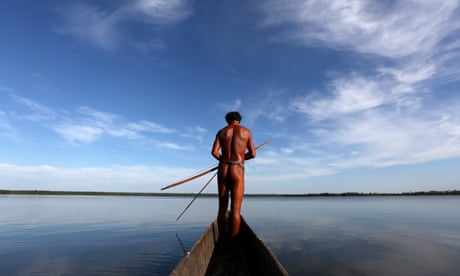Health ministry sends team to investigate ‘concerning’ virus cases in Yanomami territory near Venezuelan border
Ten Yanomami children died from Covid-19 in January, fueling fears over the disproportionate impact the coronavirus is having on vulnerable indigenous communities in the Brazilian Amazon.
“It is very concerning that so many kids died in less than one month,” said Júnior Hekurari Yanomami, the head of Condisi-YY, an indigenous health council.
The victims were diagnosed by a local health agent and cremated following the Yanomami tradition. They lived in the remote communities of Waphuta and Kataroa, near the Venezuelan border, which are only accessible by aeroplane.
Public health specialists have warned that the coronavirus could wreak havoc on indigenous groups in a region where infectious diseases such as measles, smallpox and flu viruses have decimated such communities.

The Yanomami indigenous reserve is the size of Portugal, and a recent study showed it is particularly vulnerable to the spread of the virus, due to limited healthcare and difficult logistics. “Yanomami health has already collapsed, we have no support from the state,” Hekurari added.
The young appear to be particularly vulnerable: of 32 Yanomami who had previously been confirmed or suspected Covid-19 deaths, seven victims were under the age of two. Four others were aged between 12 and 20, including a 15-year-old boy who became the first indigenous fatality in April.
“Yanomami children are clearly more vulnerable to the virus, because many suffer from malnutrition and diseases like malaria, and some areas have no health workers,” said Maurício Ye’kwana, the director at the Hutukara Yanomami Association, speaking by Whatsapp from the community of Auaris.
The virus has now reached all indigenous territories in Brazil and led to more than 47,000 cases and 900 deaths.
At the Yanomami reserve, more than 1,600 people have tested positive, although anthropologist Ana Maria Machado, member of the Yanomami and Ye’kwana network, said that testing rates are very low: “We estimate more than 10,000 infections, considering they live in large collective houses, share utensils and have no access to alcohol cleaning solution or soap.”
Other populations in the world have seen relatively few Covid-19 deaths among children compared with other age groups. But experts in Brazil believe that the virus has a much more aggressive impact on indigenous children.
“The Covid mortality rate is much higher in indigenous under-fives than in the same age group in the general population,” said epidemiologist Andrey Cardoso, whose team at the government research institute Fiocruz will soon publish a study on the topic.
In previous research, Cardoso found that indigenous children face poorer sanitary and health conditions, with a high prevalence of anaemia, malnutrition, diarrhoea, and short stature.
The Amazon region is currently experiencing an alarming new surge in cases linked to a seemingly more contagious variant, that has pushed emergency services to their breaking point.
“This second wave is more frightening as we know a mutation is already circulating in Roraima state,” said Ye’kwana.
Brazil’s ministry of health said on Thursday it had sent a mission to investigate the cases in the Yanomami territory.
But indigenous leaders and activists accuse the government of neglecting the 28,000 Yanomami and Ye’kwana people, who depend on fewer than 200 active health workers. They have also warned of the rise in wildcat goldminers taking the virus into isolated communities during the pandemic.
The influx of illegal goldminers is a long-time trauma for the Yanomami. The gold rush that peaked in the late 1980s brought 40,000 garimpeiros, which caused violence, deforestation and outbreaks of infectious diseases.
The incursions have increased again amid the systematic dismantling of environmental policies since Jair Bolsonaro took office in 2019. This week, Brazil’s president sent to congress a list of “priority bills”, including one aimed at opening indigenous territories to mining.
According to data collected by Amazônia Minada, a project of InfoAmazonia, 142 applications for researching and mining inside the Yanomami reserve are active at Brazil’s mining agency.


Comentários